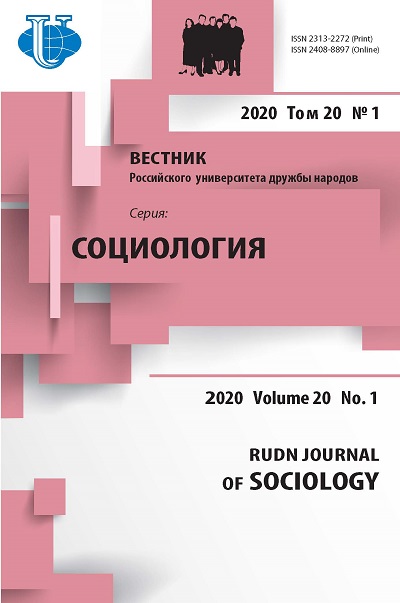Future research of the future: From technocracy to new models of sociality
- Authors: Koval E.A.1, Ushkin S.G.2
-
Affiliations:
- Middle-Volga Institute (branch) of the All-Russian State University of Justice
- Research Center for Social-Economic Monitoring
- Issue: Vol 20, No 1 (2020)
- Pages: 161-169
- Section: Reviews
- URL: https://journals.rudn.ru/sociology/article/view/22952
- DOI: https://doi.org/10.22363/2313-2272-2020-20-1-161-169
Cite item
Full Text
Abstract
The article is a review of the book by J. Urry Kak vyglyadit budushchee? [What is the Future?] (Trans. by A. Matvienko; ed. by S. Shchukina. Moscow: Delo; 2018. 320 pp.] which describes multiple discourses of the social future and methods for its research. Its author, the co-director of the Lancaster’s Institute for Social Futures, believes that futurologists focus on new technologies but the key element of crucial innovations is social phenomena. The book presents the following main aspects of the contemporary research of the future: the social future is multiple, and its various images are supported by different actors and compete; all stakeholders should take part in discussions of the future - states, markets, civil society institutions, individuals; as a rule, three methods are used to study the future - individualistic, structural and based on the theory of complex systems; the future needs not to be planned but rather coordinated. The book proves the necessity to study the future to correct the present by creating and transforming social norms, practices and value orientations.
About the authors
E. A. Koval
Middle-Volga Institute (branch) of the All-Russian State University of Justice
Author for correspondence.
Email: nwifesc@yandex.ru
доктор философских наук, главный научный сотрудник отдела научных исследований
Fedoseenko St., 6, Saransk, 430003, RussiaS. G. Ushkin
Research Center for Social-Economic Monitoring
Email: ushkinsergey@gmail.com
кандидат социологических наук, ведущий научный сотрудник
B. Khmelnitskogo St., 39a, Saransk, 430005, RussiaReferences
- Abraham M. Nasha zadacha — usilit rol sociologii v formirovanii spravedlivogo obshchestva [Sociology’s role in making of just society]. Sociological Studies. 2015; 7 (In Russ.).
- Aristotle. Etika [Ethics]. Moscow: AST; 2002 (In Russ.).
- Berger P. Svyashchennaya zavesa: elementy sociologicheskoj teorii religii [The Sacred Canopy: Elements of a Sociological Theory of Religion]. Moscow: NLO; 2019 (In Russ.).
- Burawoy M. Sociologiya i neravenstvo [Sociology facing the inequalities]. Sociological Studies. 2015; 7 (In Russ.).
- Vaganov A.G. Skelet budushchego. Zametki k prakticheskomu posobiyu po konstruirovaniyu socialnyh realnostej [Framework of the Future: Notes on Practical Guidelines for the Design of Social Realities]. Foresight. 2008; 2 (In Russ.).
- Gladwell M. Perelomny moment. Kak neznachitelnye izmeneniya privodyat k globalnym peremenam [The Tipping Point: How Little Things Can Make a Big Difference]. Moscow: Alpina Publisher; 2018 (In Russ.).
- Kin D. Demokratiya i dekadans media [Democracy and Media Decadence]. Moscow: Izd. dom VShE; 2015 (In Russ.).
- Piketty Т. Kapital v XXI veke [Capital in the Twenty-First Century]. Moscow: Ad Marginem; 2015 (In Russ.).
- Plato. Apologiya Sokrata [The apology of Socrates]. Polnoe sobranie tvoreniy Platona. Vol. I. Petersburg: Academia; 1923 (In Russ.).
- Prigogine I., Stengers I. Poryadok iz haosa. Novy dialog cheloveka s prirodoj [Order out of Chaos: Man’s New Dialogue with Nature]. Moscow: Progress; 1986 (In Russ.).
- Romanovsky N. V. Budushchee kak problema sovremennoj sociologii [Future as an Issue of the contemporary sociology]. Sociological Studies. 2015; 11 (In Russ.).
- Sterling B. Budushchee uzhe nachalos: chto zhdet kazhdogo iz nas v XXI veke? [Tomorrow Now. Envisioning the Next Fifty Years]. Ekaterinburg: U-Faktoriya; 2005 (In Russ.).
- Taleb N. Cherny lebed. Pod znakom nepredskazuemosti [The Black Swan. To Impact of the Highly Improbable]. Moscow: KoLibri; 2011 (In Russ.).
- Titarenko L.G. Budushchee obshchestva skvoz prizmu vzglyadov zarubezhnyh sociologov [Social future in the theories of Western sociologists]. Sociology. 2016; 3 (In Russ.).
- Keat R., Urry J. Social Theory as Science. London: Routledge; 1975.
- Wackernagel M., Rees W. Our Ecological Footprint: Reducing Human Impact on the Earth. Philadelphia: New Society Publishers; 1996.














